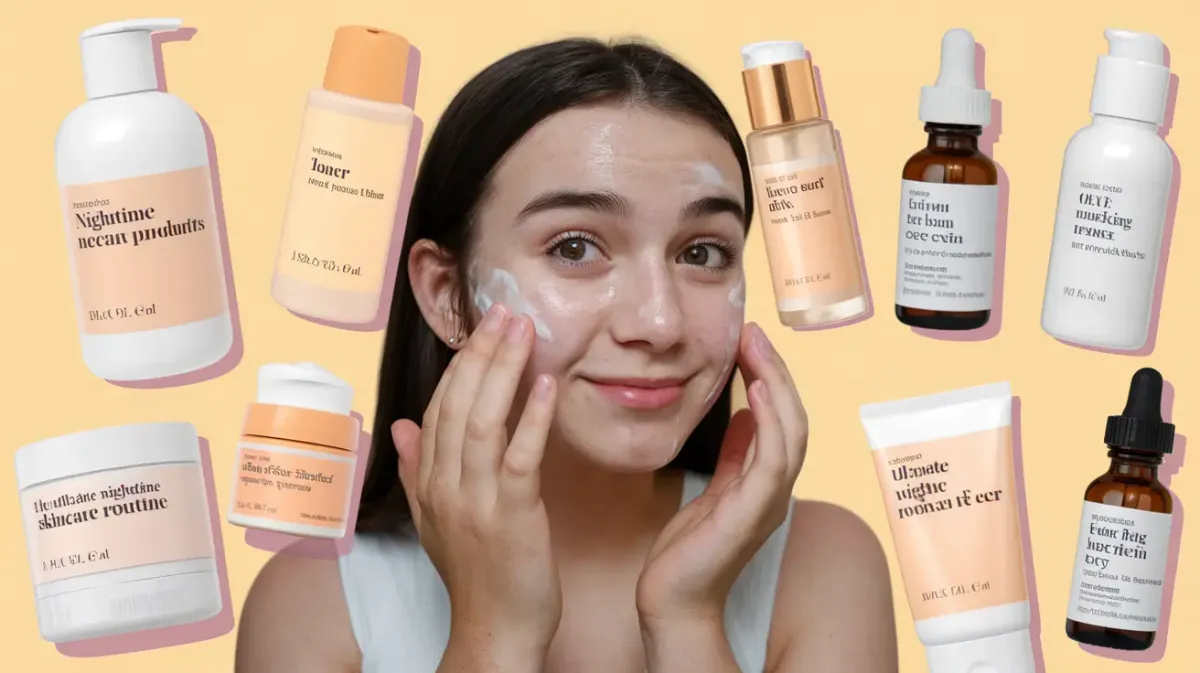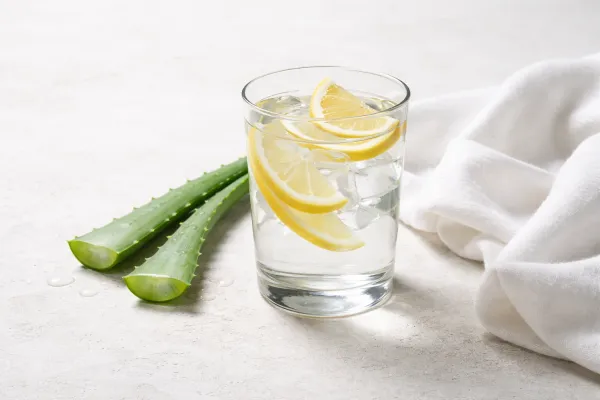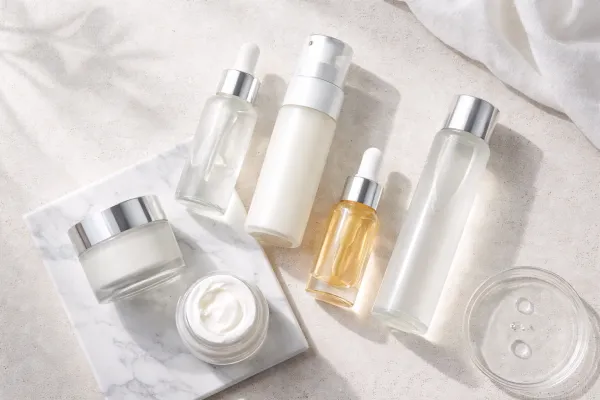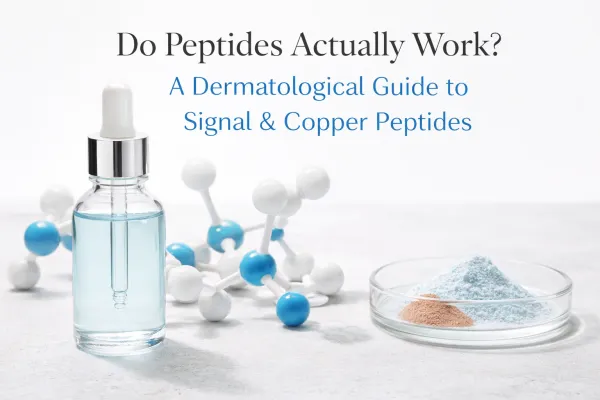The Ultimate Nighttime Skincare Routine for Teens
Discover the ultimate nighttime skincare routine for teens. Learn how to achieve clear, healthy skin with our simple step-by-step guide.

Ever wondered why some teens seem to have that effortless glow?
It’s not magic, it's often a consistent and effective nighttime skincare routine. As a teenager, your skin is going through a lot – hormonal changes, increased oil production, and maybe even a few pesky breakouts.
But don't worry, you're not alone! I've been there, battling teenage skin myself. The key is to understand what your skin needs and to develop a simple yet powerful routine that works for you.
Think of it like this, your skin is like a plant, and at night, it's time to water it and give it the nutrients it needs to grow and thrive. This guide will walk you through exactly how to do that, no complicated steps, just pure, simple, and effective skincare.
Key Takeaways: Nighttime Skincare Routine for Teens
- Double Cleansing is Crucial: Start with micellar water to remove makeup, followed by a gentle cleanser to remove impurities.
- Toning is Essential: Use a toner to balance your skin's pH and prepare it for other products.
- Treat Specific Concerns: Apply targeted treatments for acne, hyperpigmentation, or other issues.
- Retinoids for Cell Turnover: Introduce a low-strength retinoid to promote smoother skin.
- Moisturize to Hydrate: Use a suitable moisturizer to keep your skin hydrated overnight.
- Consistency is Key: Stick to your routine for the best results.
- Sunscreen is a Must: Always use sunscreen in the morning, especially when using acne treatments.
1. The Power of Double Cleansing in Your Nighttime Skincare Routine
Let's talk about the foundation of any good skincare routine: cleansing. But not just any cleansing, we're talking about double cleansing. Think of it as a two-step process to ensure your skin is squeaky clean before you hit the pillow. The first step involves using a micellar water on a soft cotton round. This is your makeup remover, your first line of defense against the day's grime. It gently lifts away makeup, sunscreen, and surface-level impurities.
I remember when I first started using micellar water, it was like a game changer! I used to think my face was clean after just using a face wash, but the cotton pad told a different story. The second step is where your gentle, foaming cleanser comes in. This cleanser dives deeper, removing any remaining dirt, oil, and sweat.
For teens with acne-prone skin, a cleanser with salicylic acid is a fantastic choice. It helps to unclog pores and fight those pesky breakouts. For those with sensitive skin, a gentle cleanser without harsh chemicals is the way to go.
Remember, the goal is to clean your skin thoroughly without stripping it of its natural oils. It's a delicate balance, but with the right products, you can achieve it.
Choosing the right cleanser is the first step to clear skin.
- Micellar Water: Removes makeup and surface impurities.
- Foaming Cleanser: Cleanses deeper, removing dirt and oil.
- Salicylic Acid Cleansers: Ideal for acne-prone skin.
- Gentle Cleansers: Best for sensitive skin.
2. Toning and Exfoliation: Balancing Your Skin's pH

After cleansing, your skin is ready for the next step: toning. Now, toners have come a long way. They're not just about removing the last traces of cleanser anymore. Modern toners are packed with active ingredients that can do wonders for your skin. Think of them as a prep step, getting your skin ready to absorb all the goodness from your other skincare products.
A good toner helps to restore your skin's pH balance, which can be disrupted by cleansing. This is crucial for maintaining a healthy skin barrier. Many toners today contain ingredients like AHAs (alpha hydroxy acids), hyaluronic acid, and vitamins.
AHAs are great for exfoliation, helping to remove dead skin cells and reveal brighter skin underneath. Hyaluronic acid is a hydration powerhouse, attracting moisture to your skin. And vitamins, well, they're just good for everything! For teens, a toner with a blend of these ingredients can be incredibly beneficial. I've seen firsthand how a good toner can transform dull, tired-looking skin into a radiant canvas.
However, it's important to be mindful of your skin type. If you have sensitive skin, opt for a toner with gentle ingredients and avoid those with high concentrations of acids. Remember, skincare is not a one-size-fits-all approach; it's about finding what works best for your unique skin.
| Toner Ingredient | Benefits |
|---|---|
| AHAs (Alpha Hydroxy Acids) | Exfoliates, removes dead skin cells, brightens skin |
| Hyaluronic Acid | Hydrates, attracts moisture to the skin |
| Vitamins | Nourishes and supports overall skin health |
3. Treating Skin Concerns: Targeted Nighttime Solutions
Nighttime is prime time for treating specific skin concerns. This is when your skin is in repair mode, making it the perfect time to apply targeted treatments. If you're dealing with acne, this is where products with salicylic acid or benzoyl peroxide come into play. These ingredients work to reduce inflammation, unclog pores, and kill acne-causing bacteria.
For hyperpigmentation, which can be caused by sun exposure or acne scars, serums containing brightening agents like arbutin, glycolic acid, azelaic acid, or lactic acid are your best friends. These ingredients help to fade dark spots and even out your skin tone.
I remember when I was a teen, I had a few stubborn acne scars that just wouldn't go away. It was only when I started using a serum with azelaic acid that I finally saw a difference. It's important to be patient and consistent with these treatments. Don't expect overnight miracles, but with regular use, you'll definitely see improvement.
Explore your acne treatment options to find the best fit for your skin.
Remember, every skin is different, so what works for one person may not work for another. It's all about understanding your skin and finding the right products to address your specific concerns.
- Acne Treatments: Salicylic acid, benzoyl peroxide.
- Hyperpigmentation Treatments: Arbutin, glycolic acid, azelaic acid, lactic acid.
- Consistency: Regular use is key for seeing results.
4. The Role of Retinol in Your Nighttime Skincare Routine
Let's talk about the powerhouse ingredient: retinol. Retinoids, which are derivatives of vitamin A, are like the superheroes of skincare. They work by promoting cell turnover, which means they help your skin shed old, dead cells and replace them with new, healthy ones. This process can lead to smoother, tighter skin with fewer fine lines and wrinkles.
Now, I know what you're thinking, "I'm a teen, why do I need to worry about wrinkles?" Well, the truth is, starting retinol early can be a great way to prevent future skin issues. It's also effective for treating acne and hyperpigmentation. However, retinol can be potent, so it's crucial to start with a low-strength product and gradually increase the strength as your skin becomes more tolerant.
I remember when I first started using retinol, my skin got a little dry and flaky. But I stuck with it, and after a few weeks, my skin looked amazing!
It's all about finding the right balance and listening to your skin. If you experience any irritation, reduce the frequency of use or switch to a lower strength. Retinol is a long-term game, and the results are well worth the effort. It's one of those ingredients that I wish I had started using earlier in my life.
- Start Low: Begin with a low-strength retinoid.
- Gradual Increase: Increase strength as your skin tolerates it.
- Cell Turnover: Promotes healthy skin cell renewal.
- Acne and Hyperpigmentation: Effective for treating these conditions.
5. Moisturizing: The Key to Hydrated Skin
Moisturizing is an absolute must, no matter your skin type. Even if you have oily skin, you still need to moisturize. The key is to choose the right moisturizer for your skin type. For oily or acne-prone skin, an oil-free moisturizer or oil control emulsion is ideal. These provide hydration without adding extra oil to your skin. For dry skin, a thicker, richer moisturizer is recommended.
Think of it like this, your skin needs water to survive, and moisturizer helps to lock in that water. I've seen so many teens make the mistake of skipping moisturizer because they think it will make their skin more oily. But in reality, skipping moisturizer can actually cause your skin to produce more oil to compensate for the lack of hydration, which can lead to more breakouts.
Adding a hydrating serum before your moisturizer can further enhance moisture retention without adding any oil. This is especially helpful during the colder months when your skin tends to get drier. The goal is to keep your skin hydrated and balanced throughout the night. Remember, hydrated skin is healthy skin, and healthy skin is happy skin.
Find the best moisturizer for your skin type.
| Skin Type | Recommended Moisturizer |
|---|---|
| Oily/Acne-Prone | Oil-free moisturizer or oil control emulsion |
| Dry | Thicker, richer moisturizer |
| All Skin Types | Hydrating serum before moisturizer |
6. Additional Tips for a Successful Nighttime Skincare Routine
Now that we've covered the main steps, let's talk about some additional tips that can make a big difference in your nighttime skincare routine.
First, always pat your face dry with a towel instead of rubbing. Rubbing can irritate your skin and cause redness. Think of it like drying a delicate flower; you want to be gentle.
Second, make sure all your products are non-comedogenic. This means they won't clog your pores, which is crucial for preventing breakouts. I've learned this the hard way, using products that were too heavy and ended up with a face full of pimples.
Third, and this is super important, always use sunscreen in the morning. This is especially crucial if you're using acne treatments or retinoids, as these can make your skin more sensitive to the sun.
Sunscreen is your best friend in preventing photodamage and hyperpigmentation. I can't stress enough how important sunscreen is, not just in the summer, but every single day. It's the best anti-aging product you can use, and it's never too early to start. These small changes can make a huge difference in the overall health and appearance of your skin. Remember, consistency is key. Stick to your routine, and you'll start seeing results.
- Pat Dry: Avoid rubbing your face with a towel.
- Non-Comedogenic: Use products that won't clog pores.
- Sunscreen: Always use sunscreen in the morning.
7. The Importance of Consistency in Your Skincare Routine
Okay, let's talk about consistency. You can have the best skincare products in the world, but if you're not consistent with your routine, you won't see the results you're hoping for.
Think of it like going to the gym; you can't expect to see results after just one workout. It takes time and consistent effort. The same goes for your skin. It's about building a habit and sticking to it, even when you're tired or busy. I know it can be tempting to skip your routine when you're exhausted, but trust me, your skin will thank you for it. I've been there, too, wanting to just crash into bed after a long day.
But I've learned that taking those few extra minutes to care for my skin makes a huge difference. It's about making it a part of your daily life, like brushing your teeth. And the more you do it, the easier it becomes. It's like building a muscle; the more you use it, the stronger it gets.
So, commit to your routine, be patient, and you'll start seeing the positive changes in your skin. It's a journey, not a race, and the rewards are definitely worth it. Start your skincare journey slowly and build the habit.
- Build a Habit: Make your routine a part of your daily life.
- Be Patient: Results take time and consistent effort.
- Don't Skip: Even when you're tired, stick to your routine.
8. Addressing Common Teenage Skin Concerns
Teenage skin can be a rollercoaster ride. One day it's clear, the next day it's a breakout city. It's all part of the hormonal changes that come with being a teenager. But don't worry, there are ways to manage these common skin concerns. Acne is probably the most common issue, and it's often caused by increased oil production and clogged pores.
The key is to use gentle, non-comedogenic products and avoid picking at your skin. Picking can lead to scarring and make breakouts worse. Blackheads and whiteheads are also common, and they're essentially clogged pores.
Exfoliating regularly can help to remove dead skin cells and prevent these from forming. Another common issue is oily skin, which can make your face look shiny and greasy. Using an oil-free cleanser and moisturizer can help to control oil production.
I remember when I was a teen, I used to try all sorts of harsh products to get rid of my acne, but it only made things worse. It was only when I started using gentle products and being consistent with my routine that I finally saw improvement. It's about understanding your skin and finding the right approach. Learn how to manage oily skin effectively.
- Acne: Use gentle, non-comedogenic products.
- Blackheads/Whiteheads: Exfoliate regularly.
- Oily Skin: Use oil-free products.
- Avoid Picking: Picking can lead to scarring and make breakouts worse.
9. The Impact of Diet and Lifestyle on Your Skin
Your skin is a reflection of what's going on inside your body. So, it's not just about what you put on your skin, but also what you put in your body. A balanced diet rich in fruits, vegetables, and whole grains can do wonders for your skin. Processed foods, sugary drinks, and unhealthy fats can contribute to inflammation and breakouts.
I've noticed that when I eat a lot of junk food, my skin tends to break out more. It's like my skin is telling me, "Hey, I don't like this!" Drinking plenty of water is also crucial for keeping your skin hydrated and healthy. Dehydration can make your skin look dull and dry. Getting enough sleep is also important, as your skin repairs itself while you sleep.
Stress can also have a negative impact on your skin, so finding ways to manage stress is essential. This could be through exercise, meditation, or spending time doing things you enjoy. It's all about taking a holistic approach to skincare, considering not just the products you use, but also your overall lifestyle. Remember, healthy skin starts from within. Learn how diet affects your skin.
- Balanced Diet: Eat plenty of fruits, vegetables, and whole grains.
- Hydration: Drink plenty of water.
- Sleep: Get enough sleep for skin repair.
- Stress Management: Find healthy ways to manage stress.
10. Expert Advice and Personal Anecdotes
As someone who's been through the teenage skin struggles myself, I can tell you that it's a journey. There will be good days and bad days, but the key is to stay consistent and patient. Don't compare your skin to others, everyone's skin is different, and what works for one person may not work for another.
remember when I was a teen, I used to try every skincare trend I saw on social media, and it only made my skin worse. It was only when I started listening to my skin and finding products that worked for me that I finally saw improvement. It's also important to be gentle with your skin. Avoid harsh products and over-exfoliating, as this can damage your skin barrier. I've learned that less is often more when it comes to skincare.
Don't feel pressured to use a million different products; focus on the basics and find what works for you. And most importantly, be kind to yourself. Your skin is just one part of who you are, and it doesn't define your worth. Embrace your unique beauty, and remember that everyone has their own skin journey. "The most beautiful makeup of a woman is passion.
But cosmetics are easier to buy." - Yves Saint Laurent. This is a quote that always reminds me that true beauty comes from within, but a little skincare can definitely help boost your confidence. Skincare tips for teenage girls can help you navigate these challenges.
- Be Patient: Results take time.
- Listen to Your Skin: Find products that work for you.
- Be Gentle: Avoid harsh products and over-exfoliating.
- Be Kind to Yourself: Your skin doesn't define your worth.
Conclusion
Developing a solid nighttime skincare routine for teens doesn't have to be complicated. It's about understanding your skin's needs, choosing the right products, and being consistent with your routine. Remember, it's a journey, and there will be ups and downs. But with patience and persistence, you'll achieve healthy, glowing skin.
Don't be afraid to experiment and find what works best for you. And most importantly, be kind to yourself. Your skin is just one part of who you are, and it doesn't define your worth. Embrace your unique beauty, and remember that everyone has their own skin journey.
The key is to be consistent, patient, and kind to your skin. With the right routine and a little self-love, you'll be well on your way to achieving the radiant skin you deserve. So, go ahead, start your journey to healthier skin tonight!
Frequently Asked Questions
How often should I exfoliate my skin?
It depends on your skin type. Generally, 1-2 times a week is sufficient for most teens. It depends on your skin type and the type of exfoliant you're using. Generally, 1-3 times per week is a good starting point. If you have sensitive skin, start with once a week and gradually increase as tolerated. Avoid over-exfoliating, which can cause irritation. Because many beauty products contain preservatives, chemicals or fragrances that could irritate or dry out your skin, it's a good idea to introduce new products one at a time. Introducing too many new products at once can overwhelm your skin and cause further irritation. Avoid harsh cleansers and over-exfoliation.
Can I use adult skincare products?
It's best to use products specifically formulated for teens, as adult products can be too harsh. It's best to avoid using adult skincare products, as they can be too harsh for teenage skin. Instead, opt for products specifically formulated for teens, which are often gentler and more suitable for sensitive skin. The skin care products you choose will depend on your skin type. If you have acne-prone skin, look for cleansers and moisturizers that say "oil free" or "non-comedogenic," as these won't clog your pores. If you have sensitive skin, use mild, "fragrance free" products, as products containing fragrances can leave skin feeling irritated and dry.
What if I have sensitive skin?
Choose gentle, fragrance-free products and avoid harsh chemicals. If you have sensitive skin, use mild, "fragrance free" products, as products containing fragrances can leave skin feeling irritated and dry. Fragrances and other potential allergens can irritate and further compromise a damaged skin barrier, especially in those with sensitive skin or conditions like eczema and rosacea. Fragrance-free and hypoallergenic products minimize the risk of irritation, allowing the skin to focus on repair. Teens with sensitive skin should avoid harsh ingredients like retinol, exfoliating acids, abrasive physical exfoliants, fragrances, and alcohol. These can cause irritation, redness, and breakouts.
How long does it take to see results?
It can take several weeks or even months to see noticeable results, so be patient. It can take several weeks to months to see significant improvement. Consistency is crucial, and patience is key. Changes vary for everyone. Your skin cells renew constantly. You might see small improvements in a few weeks. Think less redness or more hydration. Full, noticeable benefits often take 1-3 months. Stick with it. Consistency is the real secret. Your skin needs time to respond. Like any wellness journey, patience and persistence are key to achieving lasting results. Don't expect immediate results.
Is it okay to skip my routine sometimes?
It's best to stick to your routine as consistently as possible for the best results. A consistent skincare routine with a gentle cleanser, targeted treatments (like retinoids or benzoyl peroxide), and a lightweight moisturizer is key. Do this twice daily. Consistency is key when it comes to seeing results from acne treatments. It's about taking a holistic approach to your health and well-being. Besides using the right moisturizer, several lifestyle factors can support barrier repair. Consistency and patience are key. Results can vary depending on the severity of the barrier damage and the specific product used. Some people may notice improvements within days, while others may take several weeks.




